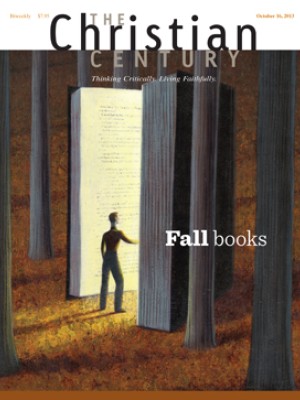Global Christianity & American religious history
To the Ends of the Earth: Pentecostalism and the Transformation of World Christianity, by Allan Heaton Anderson. Given the importance of Pentecostal and charismatic forms of faith in Christian expansion worldwide, Anderson’s book is valuable and timely. He integrates historical and theological discussion into a remarkably concise account with an impressive global sweep and is properly critical of his subject where appropriate.
The Missionary’s Curse and Other Tales from a Chinese Catholic Village, by Henrietta Harrison. Harrison’s splendid book traces the history of Catholicism in one Chinese village over three centuries, a story of survival despite all the assaults of successive imperial and atheist regimes. It’s fascinating to see how Catholic Christianity became fully integrated into the life of the village, in a friendly acculturation that often led to trouble with European authorities. The book also offers memorable biographical sketches of key individuals.
Read our latest issue or browse back issues.
Escape from North Korea: The Untold Story of Asia’s Underground Railroad, by Melanie Kirkpatrick. Journalist Kirkpatrick gives an inspiring account of the Christian-led efforts to help North Koreans escape from what may well be the world’s worst country. It’s hard to say whether the reader will be struck more by the heroism of the rescuers or the determination of ordinary Koreans to live and worship freely, whatever the risk. The book is a stirring evocation of faith in action.
Persecuted: The Global Assault on Christians, by Paul Marshall, Lela Gilbert and Nina Shea. Persecuted offers a stunning and often heartbreaking description of anti-Christian persecutions worldwide. Although the authors describe situations in which persecutors are Muslim, this is not a tirade against Islam as such. Several of the authors’ examples concern the persecution of Christians by Hindus, Jews and other Christians, as well as by secular states. This is a rich and informative book, very up-to-the-moment in its coverage. Harrowing and necessary.
The Global Diffusion of Evangelicalism: The Age of Billy Graham and John Stott, by Brian Stanley. In the history of Christian globalization, the era between 1950 and 1980 is particularly significant. These years marked the extinction of European empires and the massive growth of new churches, especially in their evangelical and charismatic forms. Stanley’s wide-ranging history traces the formation of global networks, with an emphasis on new concepts of mission and innovative attempts to build bridges between cultures.
Abraham Kuyper: Modern Calvinist, Christian Democrat, by James D. Bratt. A hefty text, this book will stand for decades as the definitive biography of the near-legendary theologian Abraham Kuyper (1837–1920). Kuyper exerted unprecedented and unparalleled influence over Dutch—and Dutch-American—religious, intellectual, cultural and political life in the turn-of-the-century decades. Bratt’s work not only does this titanic figure justice but also serves as a model for how to do biography right. He deeply contextualizes Kuyper in his age and place, including both sides of the Atlantic. Bratt’s summary judgment about his subject—“Kuyper was a great man but not a nice one”—captures the honesty, clarity and wit of Bratt’s first-rate craftsmanship.
Sarah Osborn’s World: The Rise of Evangelical Christianity in Early America, by Catherine A. Brekus. Sarah Osborn’s World represents American religious history at its best. It is beautifully written, massively researched and cogently argued. Without a trace of jargon, Brekus sweeps back and forth from the microcosmic to the macrocosmic levels. She shows how the great streams of 18th-century cultural and intellectual history—mercantilism, rationalism, pietism, puritanism and evangelicalism—flowed from the pen of this virtually unknown and perennially impoverished wife and mother. Osborn’s outlook was both dramatically different from and hauntingly similar to our own. Brekus captures those two realities by deftly weaving analysis into a compelling narrative. No small achievement.
The Christian Century and the Rise of the Protestant Mainline, by Elesha J. Coffman. Coffman’s elegantly crafted and subtly witty account pursues two goals at once. First, it offers a history of this curiously understudied yet venerable and influential periodical. Second, it provides an astute analysis of how the Century helped create both the perception and the brick-and-mortar presence of a tall-steeple mainline in American Protestantism. Coffman shows that after the 1950s the mainline gradually lost much of its market share among ordinary church members but retained or even expanded its sway in theologically and politically liberal quarters of American life. The book also makes a theoretically sophisticated contribution to the growing scholarship on religious media in the postwar United States.
God’s Forever Family: The Jesus People Movement in America, by Larry Eskridge. “Jesus Knocked Me off My Metaphysical Ass” is the title of the first chapter of this painfully funny yet deadly serious study of the Jesus People, circa 1966 to 1976. Drawing on deep research in the movement’s prolific written sources, contemporary coverage, retrospective interviews and Internet surveys, Eskridge argues that far from being ephemeral, as commonly supposed, the Jesus People exerted a lasting impact on the larger evangelical movement. They institutionalized contemporary Christian music, furthered seeker-friendly megachurches like Willow Creek, and projected an enduring strategy of accommodation between popular culture and historical evangelicalism. The book presents a deft study of a timeless process of challenge and renewal in American Christianity.
The Indian Great Awakening: Religion and the Shaping of Native Cultures in Early America, by Linford D. Fisher. In this meticulously researched and lucidly fashioned study of colonial Indians’ encounters with European Christians, Fisher presses historians to move beyond idealized narratives of Indians undergoing blue-sky irreversible conversions. With great persuasive power, he details the ambiguities and paradoxes, affiliations and disaffiliations that marked the lives of real people caught in the maw of colliding worldviews, land grabs and racial barriers. Yet the story is also one of resilience and agency, as American Indians found uncounted ways to embrace the faith and turn it to their own purposes. A bear paw and a Bible page, an eagle feather and a wooden cross, fixed together, capture the juxtaposed histories and entwined meanings of their experiences.

















